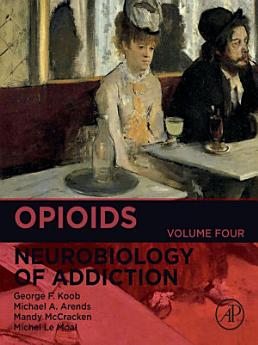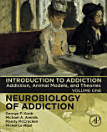Opioids
May 2023 · Neurobiology of Addiction Series Book 4 · Academic Press
Ebook
424
Pages
family_home
Eligible
info
reportRatings and reviews aren’t verified Learn More
About this ebook
A current survey and synthesis of the most important findings in our understanding of the neurobiological mechanisms of addiction is detailed in our Neurobiology of Addiction series, each volume addressing a specific area of addiction. Opioids, Volume 4 in the series, explores the molecular, cellular and systems in the brain responsible for opioid addiction using the heuristic three-stage cycle framework of binge/intoxication, withdrawal/negative affect, and preoccupation/anticipation. - Highlights recent advances in opioid addiction - Includes Neurocircuitry, Cellular and Molecular neurobiological mechanisms of opioid addiction - Defines opioid abuse and addiction potential, including biological tolerance
About the author
Dr. Koob is an internationally-recognized expert on alcohol and stress, and the neurobiology of alcohol and drug addiction. He is the Director of the National Institute on Alcohol Abuse and Alcoholism (NIAAA), overseeing a broad portfolio of alcohol research ranging from basic science to epidemiology, diagnostics, prevention, and treatment. Dr. Koob earned his doctorate in Behavioral Physiology from Johns Hopkins University in 1972. Prior to taking the helm at NIAAA, he served as Professor and Chair of the Scripps' Committee on the Neurobiology of Addictive Disorders and Director of the Alcohol Research Center at the Scripps Research Institute. Early in his career, Dr. Koob conducted research in the Department of Neurophysiology at the Walter Reed Army Institute of Research and in the Arthur Vining Davis Center for Behavioral Neurobiology at the Salk Institute for Biological Studies. He was a post-doctoral fellow in the Department of Experimental Psychology and the MRC Neuropharmacology Unit at the University of Cambridge. Dr. Koob began his career investigating the neurobiology of emotion, particularly how the brain processes reward and stress. He subsequently applied basic research on emotions, including on the anatomical and neurochemical underpinnings of emotional function, to alcohol and drug addiction, significantly broadening knowledge of the adaptations within reward and stress neurocircuits that lead to addiction. Dr. Koob has authored more than 650 peer-reviewed scientific papers and is a co-author of The Neurobiology of Addiction.Michael A. Arends received his Bachelor of Science degree from the University of California, San Diego. He is currently a Senior Research Assistant in the Committee on the Neurobiology of Addictive Disorders at The Scripps Research Institute and has worked in the field of the neurobiology of drug addiction for 20 years. He is Managing Editor for the journals Pharmacology Biochemistry and Behavior and Journal of Addiction Medicine. He has been acknowledged for his editorial and research assistance in over 450 scientific publications, including books, book chapters, and journal articles.Dr. McCracken is a senior post-doctoral fellow at the National Institute on Drug Abuse in Bethesda, Maryland. She graduated with Honors in Biology and Psychology from The University of Texas at Austin and then earned a Ph. D. in Pharmacology and Toxicology at the College of Pharmacy at The University of Texas at Austin. Her research interests focus on molecular neurobiological mechanisms involved in neuroadaptations to drugs of abuse including opioids and alcohol. She has identified key sites on GABA-A receptors and glycine receptors important for the neuronal actions of alcohol. She has extensive experience in teaching as an Assistant Instructor with Dr. R. Adron Harris for the course Neurobiology of Addiction at The University of Texas at Austin.
Rate this ebook
Tell us what you think.
Reading information
Smartphones and tablets
Install the Google Play Books app for Android and iPad/iPhone. It syncs automatically with your account and allows you to read online or offline wherever you are.
Laptops and computers
You can listen to audiobooks purchased on Google Play using your computer's web browser.
eReaders and other devices
To read on e-ink devices like Kobo eReaders, you'll need to download a file and transfer it to your device. Follow the detailed Help Center instructions to transfer the files to supported eReaders.







